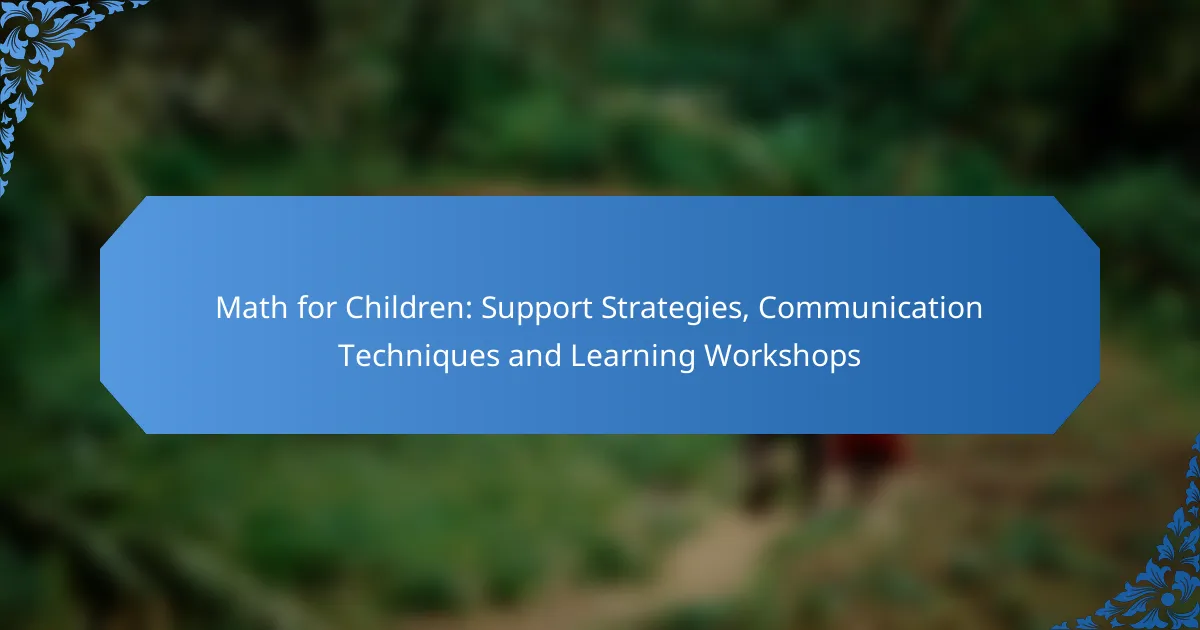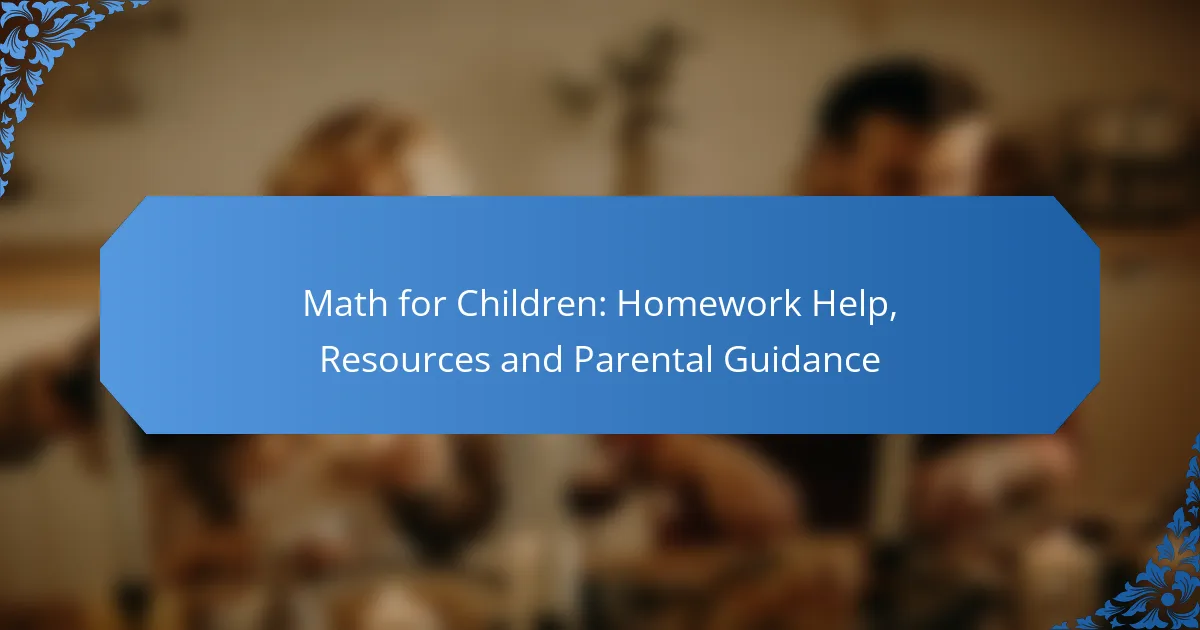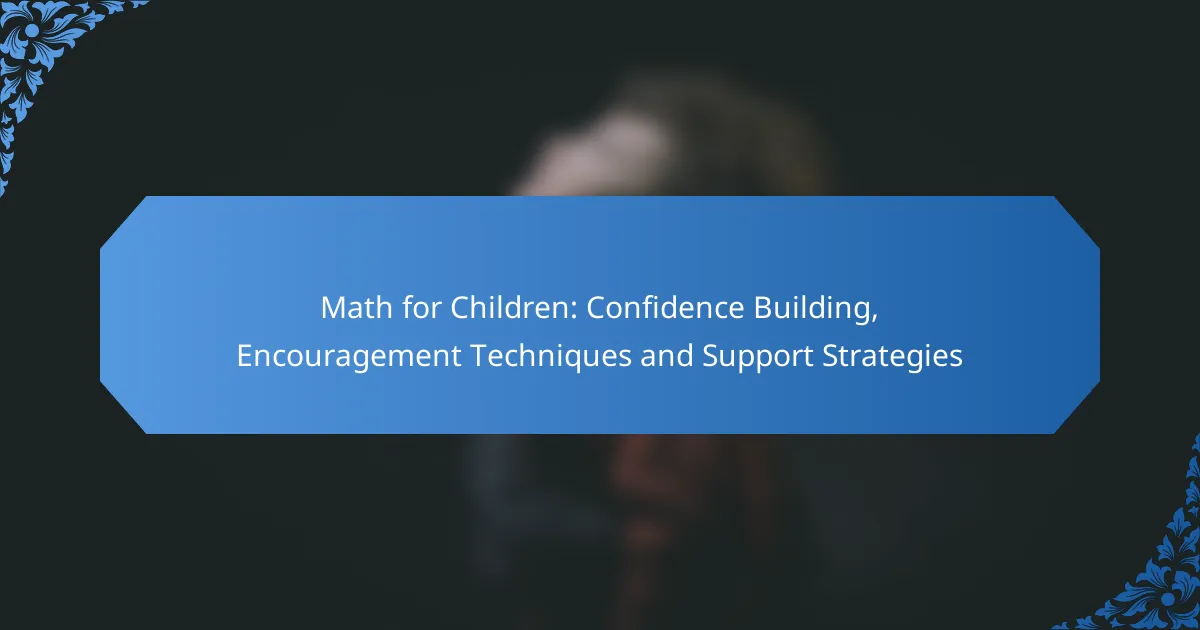Teaching math to children effectively involves using engaging strategies that accommodate various learning styles, making the subject both relatable and enjoyable. By utilizing hands-on activities, visual aids, and interactive games, educators can significantly enhance children’s grasp of mathematical concepts. Additionally, effective communication techniques foster a supportive learning environment, boosting student confidence and understanding. Various learning workshops, including online sessions and parent-child collaborations, are available to further support children’s math skills development.
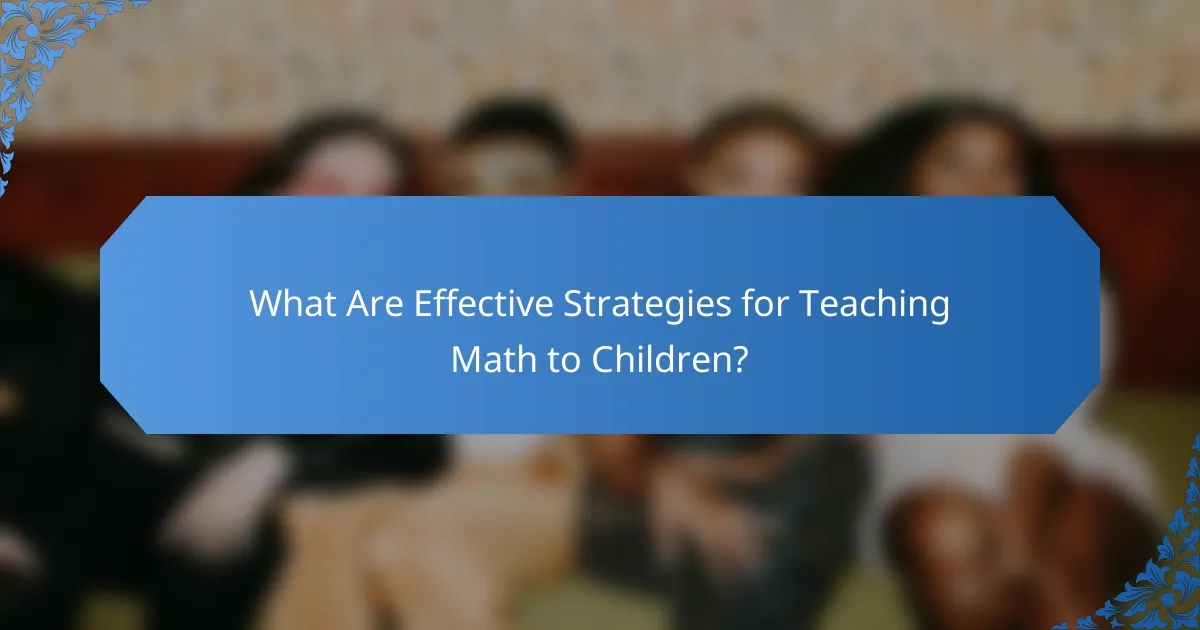
What Are Effective Strategies for Teaching Math to Children?
Effective strategies for teaching math to children include engaging methods that cater to different learning styles, making math relatable and enjoyable. By incorporating hands-on activities, visual tools, interactive games, and real-world applications, educators can enhance children’s understanding and retention of mathematical concepts.
Hands-on Activities
Hands-on activities allow children to physically manipulate objects, making abstract math concepts more tangible. For example, using blocks or counters can help illustrate addition and subtraction in a concrete way. These activities can be adapted for various age groups, from simple counting games for younger children to more complex problem-solving tasks for older students.
Consider incorporating everyday items, like measuring cups for teaching fractions or building structures with straws to explore geometry. Such activities not only reinforce math skills but also encourage teamwork and communication among peers.
Visual Learning Tools
Visual learning tools, such as charts, diagrams, and videos, can significantly enhance children’s comprehension of math concepts. Tools like number lines or pie charts help visualize relationships between numbers and operations. Using color-coded materials can also assist in differentiating between various mathematical ideas.
Incorporating technology, such as math apps or educational software, can further support visual learning. These resources often provide interactive elements that engage children and allow for self-paced learning, which is beneficial for diverse learning speeds.
Interactive Games
Interactive games make learning math fun and engaging, promoting a positive attitude towards the subject. Board games, card games, or online math challenges can reinforce skills like addition, subtraction, and problem-solving in a playful environment. Games that require strategy, such as Sudoku or logic puzzles, can also develop critical thinking skills.
When selecting games, ensure they are age-appropriate and align with the math concepts being taught. Group games can foster collaboration, while individual games can help children practice at their own pace.
Real-World Applications
Connecting math to real-world applications helps children understand the relevance of what they are learning. Discussing topics like budgeting, cooking measurements, or time management can illustrate how math is used in daily life. For instance, involving children in grocery shopping can teach them about addition, subtraction, and unit pricing.
Encourage projects that require math skills, such as planning a small event or creating a simple budget. This not only reinforces their learning but also builds practical skills that they will use throughout their lives.
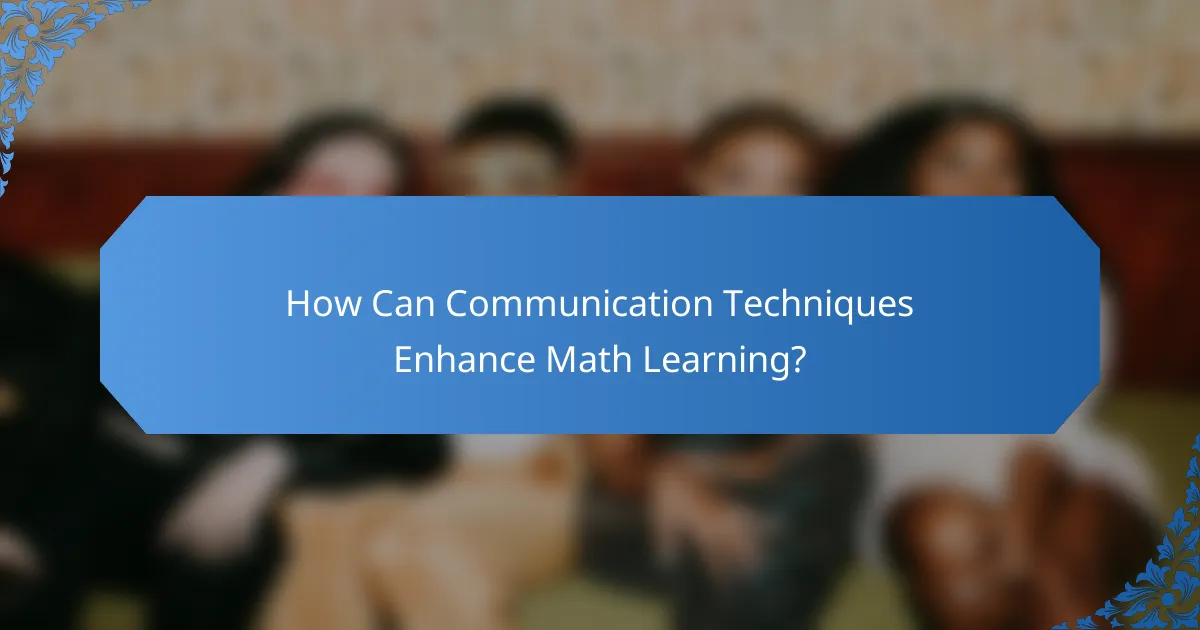
How Can Communication Techniques Enhance Math Learning?
Effective communication techniques can significantly improve math learning by fostering a supportive environment and encouraging student engagement. These methods help clarify concepts, build confidence, and promote a deeper understanding of mathematical principles.
Positive Reinforcement
Positive reinforcement involves acknowledging and rewarding students’ efforts and achievements in math. This can be as simple as verbal praise, stickers, or small rewards, which can motivate students to engage more with the subject. For example, recognizing a student’s correct answer or effort can boost their confidence and encourage them to tackle more challenging problems.
To implement positive reinforcement effectively, be specific about what behavior you are praising. Instead of general comments like “Good job,” say “I really liked how you solved that problem step by step.” This clarity helps students understand what they did well and encourages them to repeat those behaviors.
Open-Ended Questions
Open-ended questions stimulate critical thinking and allow students to express their understanding of math concepts in their own words. Instead of asking questions that require a simple yes or no answer, pose questions like “How did you arrive at that solution?” or “What strategies did you use to solve this problem?”
These types of questions encourage students to articulate their thought processes, which can reveal their understanding and areas that may need further clarification. Additionally, it fosters a classroom environment where students feel comfortable sharing their ideas and strategies.
Active Listening Skills
Active listening is crucial for effective communication in math learning. It involves fully concentrating on what the student is saying, understanding their message, responding thoughtfully, and remembering key points. This technique helps educators identify misunderstandings and address them promptly.
To practice active listening, maintain eye contact, nod in acknowledgment, and paraphrase what the student has said to confirm understanding. For instance, if a student explains their reasoning, you might respond with, “So you’re saying that you used this method because it helped you visualize the problem better?” This not only shows that you value their input but also encourages further discussion.
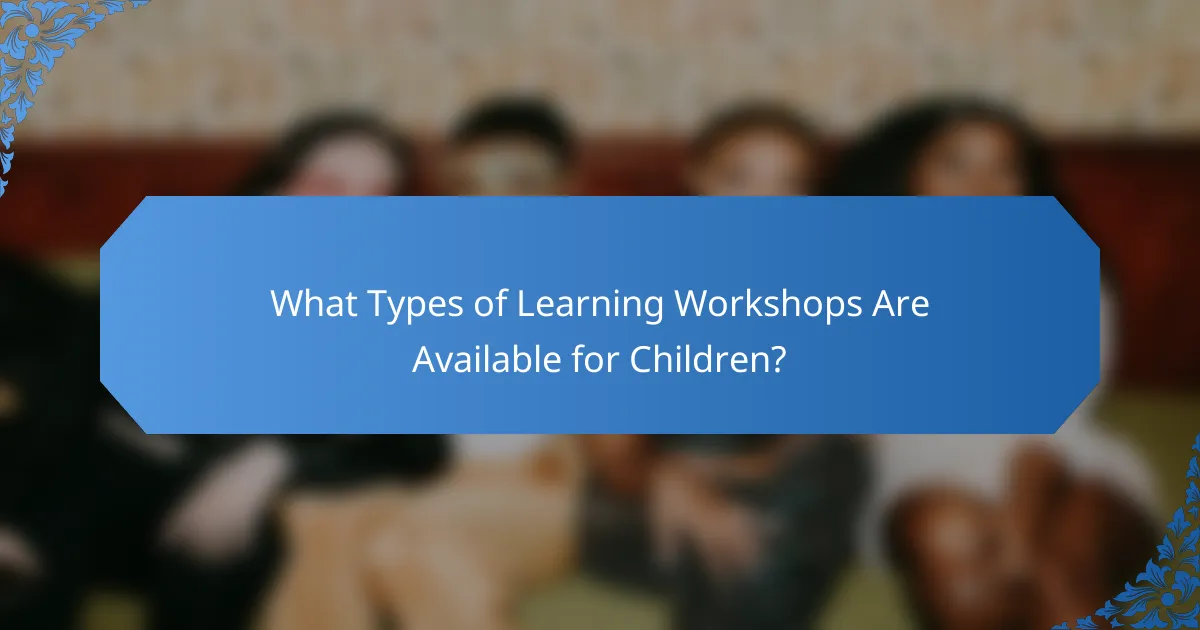
What Types of Learning Workshops Are Available for Children?
There are various learning workshops designed to enhance children’s math skills, catering to different preferences and needs. These workshops can be categorized into online math workshops, in-person group sessions, and parent-child collaborative workshops.
Online Math Workshops
Online math workshops provide flexibility and accessibility for children to learn at their own pace. These sessions often include interactive activities, video tutorials, and quizzes that reinforce concepts.
Parents should look for workshops that align with their child’s learning style and cover relevant topics. Many platforms offer free trials or low-cost options, making it easier to find a suitable fit.
In-Person Group Sessions
In-person group sessions allow children to engage directly with instructors and peers, fostering a collaborative learning environment. These workshops typically involve hands-on activities, group problem-solving, and personalized feedback.
When selecting a group session, consider the instructor’s qualifications and the class size to ensure adequate attention for each child. Local community centers or schools often host these sessions, sometimes at minimal cost.
Parent-Child Collaborative Workshops
Parent-child collaborative workshops encourage families to work together on math challenges, enhancing both understanding and communication. These workshops often focus on practical applications of math in everyday life.
Participating in these sessions can strengthen the parent-child bond while promoting a positive attitude towards math. Look for workshops that provide materials and strategies to continue learning at home, ensuring the experience extends beyond the session.

What Are the Prerequisites for Effective Math Learning?
Effective math learning requires a solid foundation of basic concepts, an understanding of individual learning styles, and supportive communication techniques. These elements help create an environment where children can thrive and develop their mathematical skills.
Understanding Basic Concepts
Grasping basic math concepts is essential for building more advanced skills. Children should be familiar with fundamental operations such as addition, subtraction, multiplication, and division before tackling complex problems. For instance, a child should be able to add single-digit numbers confidently before moving on to two-digit addition.
To reinforce these concepts, practical activities like using physical objects (e.g., blocks or counters) can be beneficial. Engaging children in real-life scenarios, such as counting items during grocery shopping, helps solidify their understanding and makes math relatable.
Identifying Learning Styles
Recognizing a child’s unique learning style can significantly enhance their math learning experience. Some children may excel with visual aids, while others might prefer hands-on activities or auditory explanations. For example, a visual learner may benefit from diagrams and charts, while a kinesthetic learner might grasp concepts better through interactive games.
To effectively support different learning styles, consider incorporating a variety of teaching methods. Mixing visual, auditory, and tactile approaches can cater to diverse preferences and keep children engaged. Regularly assessing their progress and adapting strategies accordingly can further ensure that each child receives the support they need to succeed in math.
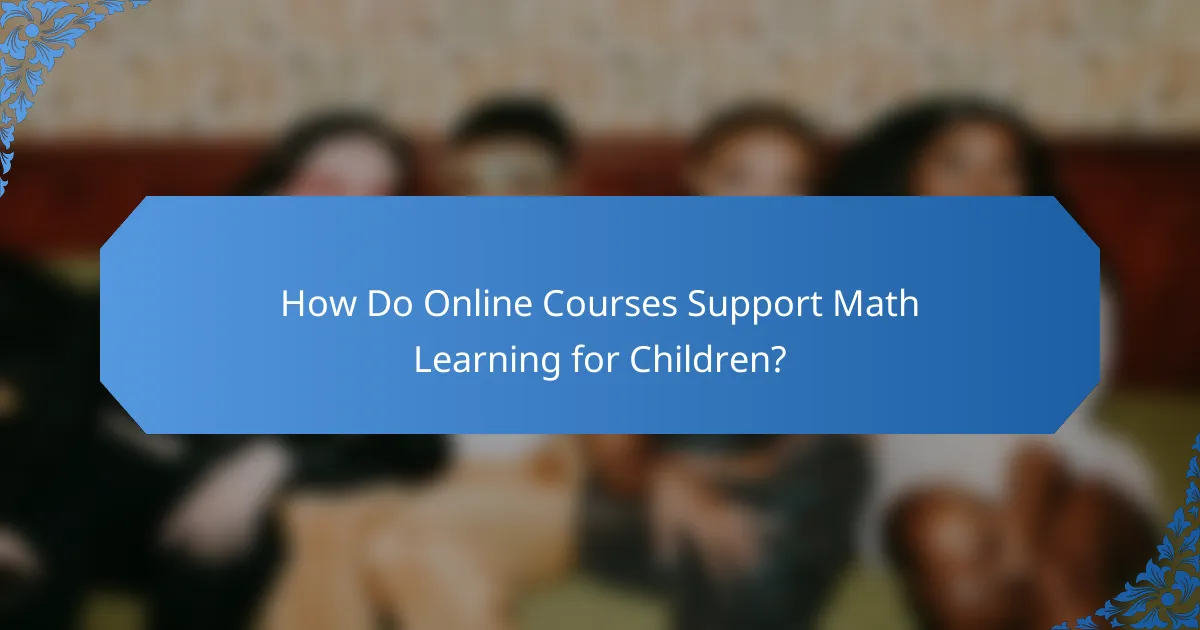
How Do Online Courses Support Math Learning for Children?
Online courses provide flexible and engaging ways for children to learn math, catering to various learning styles and schedules. These courses often combine expert instruction with interactive tools, making math concepts more accessible and enjoyable.
Flexible Scheduling
Online math courses allow children to learn at their own pace, accommodating busy family schedules. Parents can choose classes that fit into their child’s routine, whether it’s during the day or in the evening.
This flexibility can lead to better retention of math concepts, as children can revisit challenging topics as needed. For instance, a child struggling with fractions can spend extra time on that unit without feeling rushed.
Access to Expert Instructors
Many online courses feature qualified instructors who specialize in teaching math to children. This access to experts can enhance the learning experience, as instructors can provide tailored support and answer specific questions.
Instructors often use various teaching methods, including visual aids and real-world examples, to clarify complex topics. Parents should look for courses that highlight instructor qualifications and teaching styles to ensure a good fit for their child.
Interactive Learning Platforms
Interactive platforms used in online math courses engage children through games, quizzes, and hands-on activities. These elements make learning fun and help reinforce mathematical concepts through practice.
For example, platforms may include virtual manipulatives that allow children to visualize problems, such as using blocks to understand addition and subtraction. Parents should encourage their children to explore these interactive features to enhance their understanding of math.

What Are the Benefits of Math Support Strategies?
Math support strategies enhance children’s understanding and performance in mathematics by providing tailored assistance that meets individual learning needs. These strategies can lead to improved confidence, better problem-solving skills, and a more positive attitude towards math.
Effective Communication Techniques
Effective communication techniques are essential for conveying mathematical concepts clearly. Using simple language, visual aids, and real-life examples can help children grasp complex ideas more easily. Encourage questions and discussions to ensure understanding and engagement.
Learning Workshops for Children
Learning workshops provide interactive environments where children can explore math concepts hands-on. These workshops often include group activities, games, and problem-solving sessions that promote collaboration and critical thinking. Consider organizing workshops that align with local school curricula to reinforce classroom learning.
Individualized Support Plans
Individualized support plans cater to the unique learning styles and needs of each child. These plans may include one-on-one tutoring, personalized practice exercises, and regular progress assessments. Regularly review and adjust the plan based on the child’s development to ensure continued growth.
Parental Involvement
Parental involvement plays a crucial role in a child’s math success. Encourage parents to engage in their child’s learning by providing resources, participating in math-related activities, and maintaining open communication with educators. This support can significantly boost a child’s motivation and confidence in math.
